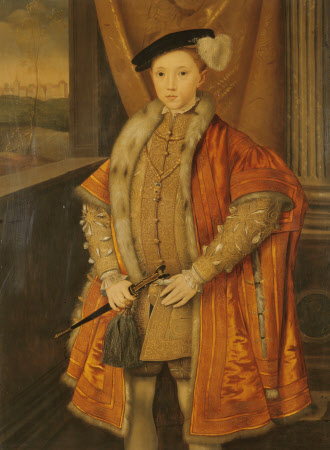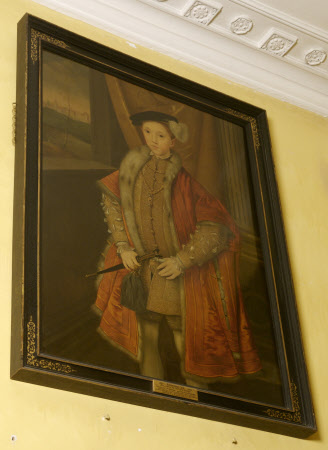King Edward VI (1537-1553), as Prince of Wales
British (English) School
Category
Art / Oil paintings
Date
1546 (after) - 1599
Materials
Oil on panel
Measurements
1143 x 870 mm (45 x 34 1/4 in)
Order this imageCollection
Montacute House, Somerset
NT 597952
Summary
Oil painting on panel, King Edward VI (1537-1553), as Prince of Wales, British (English) School, mid-16th century, after an Anglo-Flemish original of circa 1546. A portrait of Edward as a young boy, three-quarter length, standing in an interior, turned slightly to the left, gazing at spectator, black bonnet with white plume over his left ear, gold embroidered slashed doublet worn under an ermine-lined scarlet coat with false sleeves. His right hand holding a tasselled dagger, his left hand at his sash belt. An open landscape with buildings through the window aperture on the left a large drape behind him and a fluted pillar on a plinth to the right. Son of Henry VIII and Jane Seymour. The painting is a copy of the portrait in the Royal Collection that was probably painted for Henry VIII shortly before Edward's accession in 1547.
Provenance
According to the label on the picture, it was owned by the Earl of Denbigh (1859–1939) (possibly at Newnham Paddox); bought and bequeathed by Sir Percy Malcolm Stewart (1871-1951) to the National Trust in and transferred to Montacute House, 1960 after the death of Lady Stewart.
Credit line
Montacute House, The Malcolm Stewart Bequest (National Trust)
Marks and inscriptions
Recto: Small gilt tablet affixed to bottom centre of frame, inscribed:
Makers and roles
British (English) School
References
Montacute House, Somerset, 1976 [The National Trust; Dudley Dodd] 1976, "THE DINING ROOM Paintings and Tapestry Portait of Edward VI, ?by William Scrots (fl.1537-1544). Copy of a portrait at Windsor Castle." Montacute House, Somerset, 1976 [The National Trust; Dudley Dodd] 1976, An Illustrated Souvenir, Illustrated. Caption to illustration: "Edward VI. Copy of a portrait attributed to William Scrots at Windsor Castle. Stewart Bequest." Montacute House, Somerset, 1991 [The National Trust; Malcolm Rogers] 1991, p.54 appears in general view of the Dining Room, to left of fireplace. p.53. "THE DINING ROOM PAINTINGS Edward VI (1537-53) Only legitimate son of Henry VIII, by Jane Seymour; reigned 1547-53. A version of a portrait in the Royal Collection painted for Henry VIII shortly before his death, and sometimes unsatisfactorily attributed to William Scrots. For another portrait see no.4 in Room 1 on the second floor. Unknown artist, perhaps seventeenth century." Montacute House, Somerset, 1997 [The National Trust; Malcolm Rogers] 1991, revised 1997 , p.54 appears in general view of the Dining Room, to left of fireplace. p.53. "THE DINING ROOM PAINTINGS Edward VI (1537-53) Only legitimate son of Henry VIII, by Jane Seymour; reigned 1547-53. A version of a portrait in the Royal Collection painted for Henry VIII shortly before his death, and sometimes unsatisfactorily attributed to William Scrots. For another portrait see no.4 in Room 1 on the second floor. Unknown artist, perhaps seventeenth century." Montacute House, Somerset, 2004-2006 [The National Trust; Malcolm Rogers] 2000, revised 2004, reprinted 2005, 2006, p.42 appears in general view of the Dining Room, to left of fireplace. p.45. "THE PARLOUR PASSAGE PAINTINGS Edward VI (1537-53) Only legitimate son of Henry VIII, by Jane Seymour; reigned 1547-53. A version of a portrait in the Royal Collection painted for Henry VIII shortly before his death, and sometimes unsatisfactorily attributed to William Scrots. For another portrait see no.4 in Room 1 on the second floor. Unknown artist, perhaps seventeenth century."

